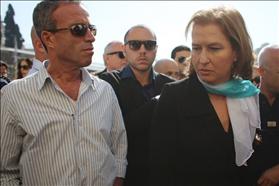Shortcomings of the short-term
MK Stern's Conversion Proposal will extend and strengthen the Orthodox conversion monopoly
Hiddush's criticism of the latest law proposal to reform Israel's conversion system is joined by unlikely choir of varying vantage points.
19/03/2014 14:58
Tags: conversion · Chief Rabbinate · Monopoly · Hatenuah · Elazar Stern

“HaTnua” Chairwoman Tzipi Livni and MK Elazar Stern, 1/03/2013. Photo: Flash 90
The law proposal to reform the conversion process in Israel, which was approved by the Constitution, Law, and Justice Committee, has come under fire for all directions. The bill, proposed by MK Elazar Stern from Hatnuah Party, aims to solve Israel's conversion problem by allowing more rabbis to conduct conversions in Israel. The law would permit city rabbis to open a conversion court and convert under their own auspices. There are currently four conversion courts in Israel today.
Habayit Hayehudi, the Zionist-Orthodox party has been exceptionally vocal in their opposition to the law proposal. MK Orit Struck, a member of Habayit Hayehudi, said that the law would create "fictitious conversions" assumedly because they might not be conducted according to strict Orthodox Jewish legal standards that the Chief Rabbinate imposes on converts. She claims that many Israeli citizens would still not be recognized as Jewish even though they converted through their city rabbis' courts.
the necessary answer is to end the Orthodox monopoly and grant full recognition to conversions from every major Jewish denomination, including those of moderate Orthodox rabbis.
Rabbi Chaim Druckman, one of the leading Zionist-Orthodox rabbis in Israel also attacked MK Stern's law proposal on conversion. He said, "it is very grave that someone thinks that it's possible to legislate laws in the Knesset that have a connection to Jewish law and that it will have any impact."
While Rabbi Druckman's claims stem from the demand that any legislation with implications on Jewish law must receive the Chief Rabbinate's approval, Hiddush agrees with Rabbi Druckman that this law
will not solve Israel's conversion crisis, but from the opposite perspective. Hiddush CEO Rabbi Uri Regev commented that, "It is pointless to promote this law which preserves and even expands the Orthodox monopoly and try and portray it as a solution to Israel's conversion conflict."
Rabbi Regev noted that "the necessary answer is to end the Orthodox monopoly and grant full recognition to conversions from every major Jewish denomination, including those of moderate Orthodox rabbis."
Conversion is one of the most sensitive areas of personal status that is controlled by the Chief Rabbinate's Orthodox monopoly over Jewish life in Israel. Along marriage, divorce, burial, and other key issues, the Chief Rabbinate's exclusive authority prevents hundreds of thousands of immigrants (primarily from the Former Soviet Union) from exercising the basic human right of creating a family in Israel.
All Jewish Israelis are forced to marry, divorce, and undergo other life cycle ceremonies through the Chief Rabbinate, which enforces strict interpretations of Jewish law. Anyone who desires to convert also must navigate the Chief Rabbinate's conversion courts, which are historically problematic and discriminatory against all non-Orthodox denominations and even moderate Orthodox Jewish leaders in the Jewish community.
Rabbi Regev added that "Rabbi Druckman's claims are further proof that, for those who are in need of this, the Orthodox institution cannot and isn't interested in dealing with the conversion challenge. The time has come to retire the Orthodox monopoly on Jewish life in Israel and the government must allow every Jewish convert to live their lives honorably as citizens with equal rights as everyone else."